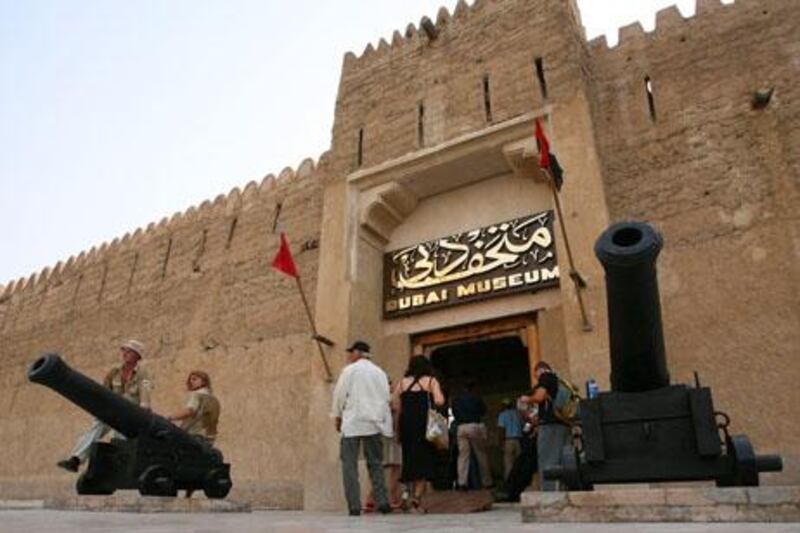DUBAI // The new James Bond author Jeffery Deaver has indulged in a bit of poetic licence in the latest adventure of the licensed-to-kill superspy.
Carte Blanche, Deaver's 007 thriller, was published last week and has been generally well received by the critics. However the scenes set in Dubai may not ring entirely true to those who know the city well.
The American author set a key plot twist in a made-up museum on the Creek and radically changed the layout of Festival City to suit the requirements of another scene. He has also altered the name of one of the UAE's high-profile airlines, Emirates, a brand name that has been built up for more than 25 years.
Deaver, who has sold 20 million books including The Bone Collector, said there were sound reasons for his flights of fancy.
Take, for instance, the decision to invent a place in Deira called the Museum of the Emirates, described as "a modern structure, three storeys high, with large glass windows, overlooking Dubai Creek".
A reader may wonder why Deaver did not set the action in the much-loved Dubai Museum, housed in the city's oldest surviving building, Al Fahidi Fort.
"There are two reasons," he said. "First, the real museum - which is superb, by the way - did not work visually for my scene; I needed a modern, glass-front structure.
"Secondly, since there is a violent undertone to what might or might not occur there, I was more comfortable setting the scene in a fictional location. I thought it wiser to separate fiction from reality."
Perhaps the greatest deviation from reality comes in a scene set in a cafe amid the shops at Festival City. Bond selects a table outside and watches two men leave the InterContinental hotel through the front door. However, because the front door is on the other side of the hotel from the mall, there is nowhere in the shopping centre that overlooks it.
Bond would have to be able to see through the hotel building to observe the front door from anywhere in the mall - and even Q Branch, which supplies his gadgets - has not come up with a way of doing that yet.
Deaver makes a point of using the real names of organisations, and even provides a glossary of the security agencies mentioned. However, a rather less clandestine organisation, Emirates, is referred to as Air Emirates - no doubt to the despair of the carrier's marketing and sponsorship departments.
Again Deaver has an explanation: "Realistic dialogue and the internal thinking of characters are very important to me. In the US we generally refer to the airline in the shorthand Air Emirates or Emirates Air, as I've heard elsewhere around the world - in the same way that United Airlines is always just United or British Airways is BA.
"I considered shortening the name to just Emirates, but I felt that would be confusing to readers in markets the airline does not serve."
Incidentally, in one scene the head of T Branch - the transport section of Bond's covert organisation - arranges a flight to Dubai for the agent. The head's name? Maurice Flanagan - no relation, of course, to Sir Maurice Flanagan, the founding chief executive of Emirates and current executive vice president of the Emirates Group.
Bond is revealed as something of an admirer of Emirates, which he feels provides the type of quality service "that typified the golden age of air travel". The food at the InterContinental also receives an enthusiastic write-up, and there are mentions for LuLu hypermarkets and standard Bond fare such as a Rolex Oyster Perpetual watch and Bentley Continental GT.
The Bond movies are, of course, notorious for their high levels of product placement. But Deaver denies that anything like this is going on in Carte Blanche, and says he is merely following the example of the late Ian Fleming, who created Bond and wrote 12 novels and several short stories with the character.
"Like Fleming, I use brand names to create concrete imagery on the part of my readers," he said. "I picked the products or services either because I'm familiar with them from prior personal experience, or the original James Bond preferred those items. There's no product placement involved. I keep waiting for a Bentley Continental GT to show up in my garage at home, but I don't think it's going to happen!"
Here’s one secret you probably didn’t know about agent James Bond
He loves to read The National. Chapter 26 of Carte Blanche begins: “James Bond had his coffee and water in front of him as he sat with the National newspaper, published out of Abu Dhabi. He considered it the best newspaper in the Middle East.
“You could find every sort of story imaginable, from a scandal about Mumbai firemen’s inefficient uniforms to pieces about women’s rights in the Arab world to a half-page expose on a Cypriot gangster stealing the body of the island’s former president from his grave.”
The passage continues with a pat on the back for The National’s sports writer Gary Meenaghan, who is covering every Grand Prix this year: “Excellent Formula One coverage too – important to Bond.”
It turns out that the author Jeffery Deaver is, like 007, an eager reader of the paper. “Yes, I am a fan,” he said. “Your online version is very well done and has been very helpful in keeping me aware of what is happening in the UAE and the region.
“I mentioned it in the book in much the same way that Ian Fleming incorporated favourite newspapers – I think the Daily Gleaner in Jamaica was one. I like the broad mix of the stories in The National and the solid journalism.”






